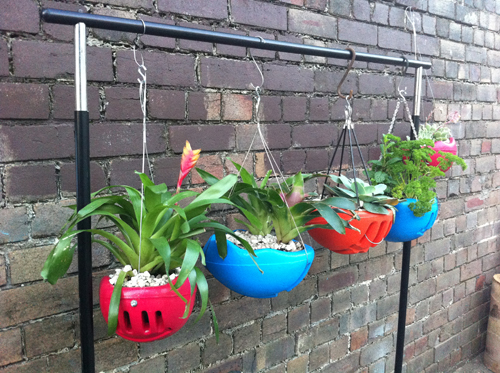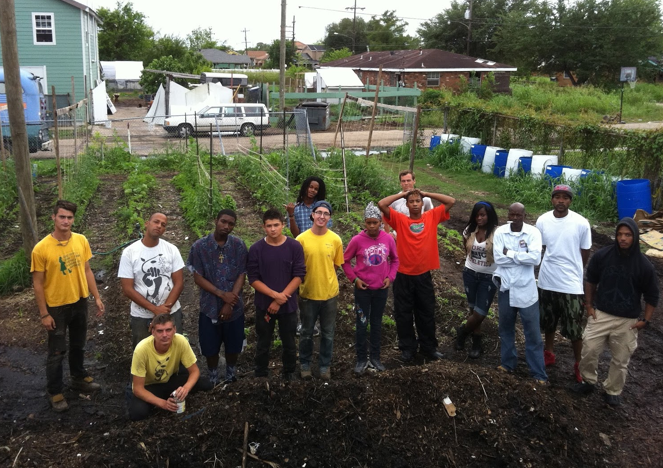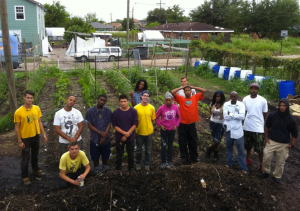
Nat Turner (third from left, white shirt) stands on a new compost pile with a group of OSBG interns, Americorps employees, and volunteers.
Nat Turner, a former New York City public-school teacher, moved to New Orleans’ Lower Ninth Ward on Thanksgiving Day, 2008. He didn’t know anything about gardening — “I could barely keep a cactus alive” — but he had a vision to start an urban farm that would be a vehicle for educating and empowering the neighborhood’s youth. He’d been making service trips to the Big Easy with students, but he wanted an opportunity to dig deeper, literally and figuratively, into the city’s revitalization.
His first goal, Turner says, “is to figure out how to make the Lower Ninth food secure.” It seems fitting, then, that in a neighborhood with no supermarket, Turner set up shop in a falling-down building that had once housed a black-owned family business called the B&G Grocery. He filled a pink bathtub in the backyard with soil and planted scallions, which floated away when the bathtub flooded in a rainstorm. That was the beginning of Our School at Blair Grocery (OSBG).
The school’s ramshackle appearance makes it look at home in the Lower Ninth, where wild plants and animals now battle residents for control of the land. I visited the school in March, and it was my second time in New Orleans. The first had been in December 2006, and my shock then at how little the hardest-hit neighborhoods had recovered since Katrina seems naïve to me now, given the fact that abandoned houses and empty lots still dominate the landscape more than five years later.
But people live in the Lower Ninth again, and that fact alone has made it less of a ghost town. Turner waves to neighbors as we drive toward the school, and I eye the sky full of thunderclouds and wonder what it felt like to watch Katrina roll in from this same spot.
After more than three years and a lot of grueling work (including picking all the glass and debris from the yard by hand so it could be planted), OSBG has become much more than a pink bathtub full of soil. Its rows of tomato plants, arugula, basil, and pole beans, framed by a background of weedy lots and some still-empty houses, present a powerful symbol of renewal. Turner and a handful of staff and interns (transplants, local teens, and three ex-offenders employed through Americorps’ Cornerstone Ministries program), as well as rotating volunteer crews, grow enough produce to sell to 10 local restaurants and the New Orleans Food Co-op. They have chickens, hoop houses, and beehives.
Turner met the urban farming pioneer and founder of Growing Power, Will Allen, in 2009, and the farm is now a Regional Outreach Training Center for the Milwaukee-based organization. Last summer, OSBG hosted a “food security academy” with around 40 kids from the neighborhood and the city’s summer youth employment program. In addition to discussing the intersections of food security, social justice, and civil rights, they calculated that it would take 1,100 tomato plants to feed the Lower Ninth Ward.
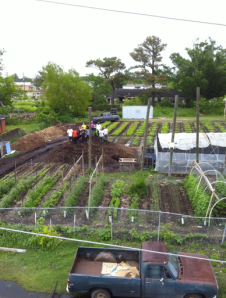
The garden has now expanded to empty lots across the street from the original site.
The garden has already expanded to the empty lot across the street, and soon the lot adjacent to that one will be planted, too. But Turner will need a lot more land, manpower, and money to scale up to the point where OSBG can indeed feed the Lower Ninth. In the meantime, the question of how to get there has often sparked controversy. Last year, he said, he fired his whole staff after internal conflict over the direction of the project reached a breaking point. Now, he’s up-front about the fact that a project like his, however noble its intentions, must become commercially viable in order to make a lasting impact.
“[This is] not gardening for fun,” Turner says. “This is urban farming.”
Gardening suggests a hobby; farming a vocation. The OSBG crew sees New Orleans struggling to move beyond the hobby phase. “There’s a lot of excitement and people having a lot of meetings and a lot of ideas,” says Sam Turner, 18, a former student of Nat Turner’s (no relation) in New York who now works at the farm. “Community gardening is great, but it’s not food justice. It’s not creating jobs.”
For an urban farm to provide food security for a neighborhood like the Lower Ninth, it has to make a profit and produce food that the community will actually eat. “Our challenge was to grow vegetables the neighbors want,” Turner explains. “Black people don’t want to eat portobello mushrooms.”
Okra, on the other hand, is a local favorite, as is mirliton. Knowing the pace at which bureaucracy moves in New Orleans, Turner is already planting up neighboring abandoned lots while waiting for the city’s approval.
“There’s nobody in Louisiana who, if they came back, would be mad if there was okra growing on their property,” he says, confidently.
Turner has garnered national attention for his approach, which combines outside-the-mainstream education with food justice work, setting OSBG apart from other more run-of-the-mill urban farming projects popping up around the Lower Ninth. As we drive past one, he points out its locked gate. There’s no gate at Blair Grocery, even though Turner says they have problems with theft. He caught one of his own employees stealing a movie projector -– a frustrating experience, to say the least, but certainly not the only one Turner’s had on the way to realizing his vision. I get the sense that, when it comes to living and working in the Lower Ninth, you have to pick your battles. Turner lets his neighbors siphon power from the school when they don’t pay their electrical bill. He turns a blind eye when the woman across the way, a friend and supporter of the project, helps herself to extra produce. He knows some of the kids who work at OSBG get up to no good in their off hours. He talks matter-of-factly about the crime, drugs, and poverty entrenched in the neighborhood, in the midst of which his urban farm and “sustainability education center” stand out as something of an oddity.
“Nobody under 50 really sees any value in any of the shit we’re doing,” he says. “Except teenagers. They’re impressionable.”
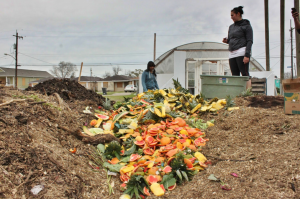
OSBG composts food scraps from several New Orleans businesses (including Whole Foods) to make their soil.
So Turner focuses on cultivating a new generation who see growing food as normal, essential, even cool. Allen Lefort, an 18-year-old from the neighborhood, is part of that. Whether or not he’ll graduate high school remains to be seen, but he works at the school just about every day, helping out with the garden and spending a lot of time on art projects: murals, paintings, and an effort to spruce up the one indoor classroom with a more colorful paint job. He got involved with the school about eight months ago, through a friend.
“I thought it was strange at first,” Lefort admits. If you’d told him last year that he’d be working at the farm, he says, “I would have been like, ‘You got me mixed up with someone else. That ain’t no job!’”
The day I was there, Lefort lingered past the time for him to go home, giving Jamie Katz, one of the full-time staff, a haircut, and eventually heading out with a pot of jambalaya to take home to his family.
“Because of the responsibilities they give you to do on the farm, I think my thoughts be maturing,” he says. “I ain’t got nothing to do, so I might as well do something that’ll help my future.”
While urban gardening is an eye-opening experience for Lefort and Our School’s other young farmers, their future-minded work carries on a tradition familiar to older generations in the Lower Ninth. “The young people we work with have never grown food, but people have been growing food in this neighborhood for a long time,” Katz said. “It’s not new. What’s new is seeing the potential in it.”
OSBG is now accepting applications for summer workshops and internships.
